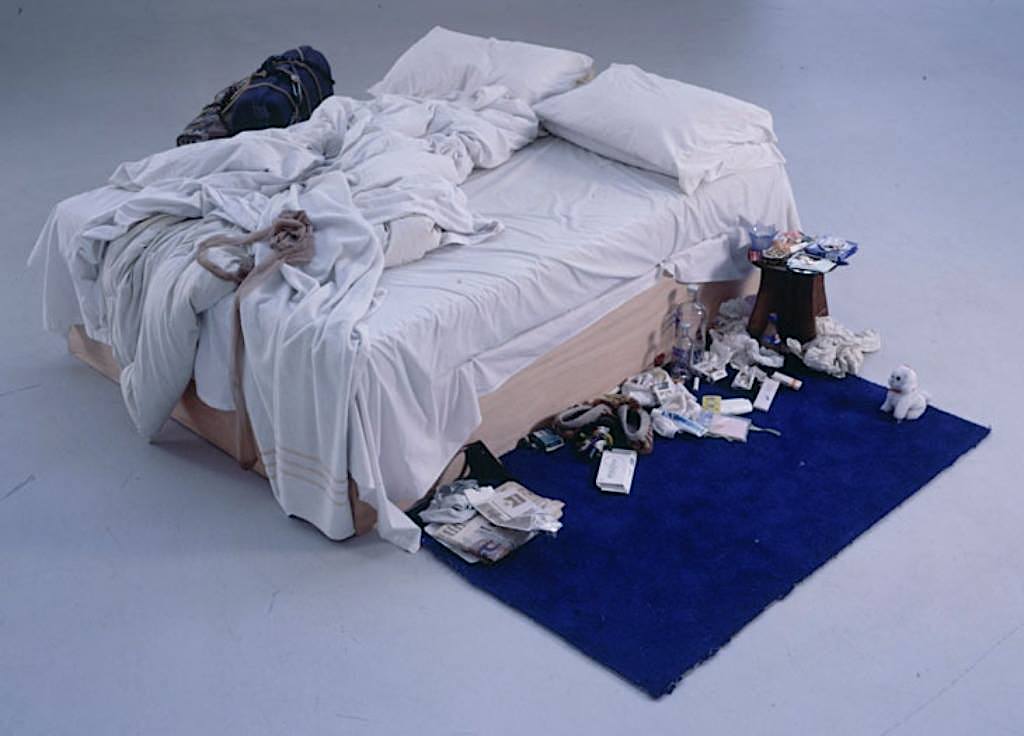
Image via Wikimedia Commons
You may have come into contact at some point with Tracey Emin’s My Bed, an art installation that reproduces her private space during a time when she spent four days as a shut-in in 1998, “heartbroken”: the bed’s unmade, the bedside strewn with cigarettes, moccasins, a bottle of booze, food, and “what appears to be a sixteen year old condom”…. If you were savvy enough to be Tracey Emin in 1998—and none of us were—you would have sold that messy room for over four million dollars last year at a Christie’s auction. I doubt another buyer of that caliber will come along for a knock-off, but this doesn’t mean the messes we make while slobbing around our own homes are without their own, intangible, value.
Those messes, in fact, may be seedbeds of creativity, confirming a cliché as persistent as the one about doctors’ handwriting, and perhaps as accurate. It seems a messy desk, room, or studio may genuinely be a mark of genius at work. Albert Einstein for example, writes Elite Daily, had a desk that “looked like a spiteful ex-girlfriend had a mission to destroy his workspace.” Einstein responded to criticism of his work habits by asking, “If a cluttered desk is a sign of a cluttered mind, then what are we to think of an empty desk?”
Mark Twain also had a messy desk, “perhaps even more cluttered than that of Albert Einstein.” To find out whether the messiness trait’s relation to creativity is simply an “urban legend” or not, Kathleen Vohs (a researcher at the University of Minnesota’s Carlson School of Management) and her colleagues conducted a series of experiments in both tidy and unruly spaces with 188 adults given tasks to choose from.
Vohs describes her findings in the New York Times, concluding that messiness and creativity are at least very strongly correlated, and that “while cleaning up certainly has its benefits, clean spaces might be too conventional to let inspiration flow.” But there are trade-offs. Read about them in Vohs’ paper—“Physical Order Produces Healthy Choices, Generosity, and Conventionality, Whereas Disorder Produces Creativity.” And just above, see Vohs’ co-author Joe Redden, Assistant Professor of Marketing at the University of Minnesota’s Carlson School of Management, discuss the team’s fascinating results. If conducting such an experiment on yourself, it might be best to do so in a space that’s all your own, though, like the rest of us, you’re too late to creatively turn the mess you make into lucrative conceptual art.
Below, as a bonus, you can watch Tracey Emin talk about the dark emotional place from which My Bed emerged.
Note: An earlier version of this post appeared on our site in 2015.
Related Content:
Why You Do Your Best Thinking In The Shower: Creativity & the “Incubation Period”
John Cleese’s Philosophy of Creativity: Creating Oases for Childlike Play
Josh Jones is a writer and musician based in Durham, NC. Follow him at @jdmagness


The exception “proves” the rule. For all others, this is a great excuse to be a slob.